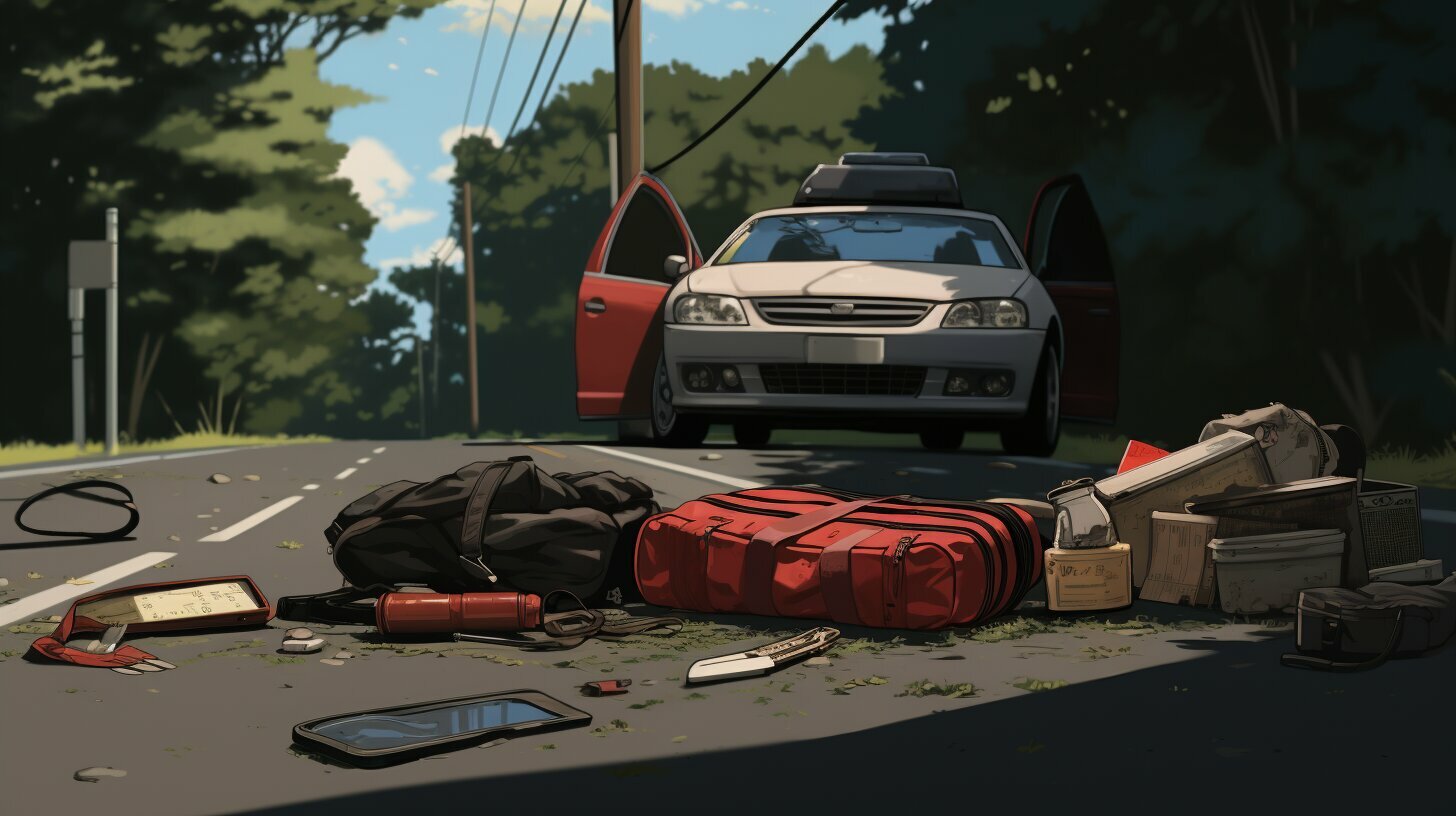In the United Kingdom, prioritising vehicle safety and emergency preparedness by having a well-stocked first aid kit in every vehicle is of utmost importance. Road accidents can occur unexpectedly, and having access to a car first aid kit can potentially save lives. In 2020 alone, there were over 115,000 casualties and 1,460 fatalities on the roads, underscoring the need to be prepared for medical emergencies.
A car first aid kit enables individuals to provide life-saving first aid and reduce the severity of injuries while waiting for emergency services to arrive. This is particularly crucial during long journeys or in rural areas where medical assistance may be delayed. By having essential items such as adhesive plasters, bandages, sterile gauze pads, and antiseptic creams, individuals can address common injuries and provide timely assistance to those in need.
Additionally, it is vital to consider carrying items for severe or life-threatening emergencies, such as hot and cold compression packs, an Epi-Pen, or a portable defibrillator. These additional supplies can enhance preparedness and enable individuals to respond effectively to critical situations.
Proper knowledge of how to use the supplies inside the car first aid kit and taking necessary precautions, such as sanitising hands and disinfecting wounds, is paramount. Regularly replenishing the kit after use ensures that it remains fully equipped and ready for any medical situation that may arise.
With a car first aid kit, individuals can take proactive measures to safeguard their well-being and that of others on the road. By being prepared and equipped to provide immediate assistance, lives can be saved and the overall impact of accidents mitigated until professional help arrives.
Road Accidents and the Need for First Aid Kits
Road accidents can happen unexpectedly, and having access to a first aid kit in your vehicle can be crucial for addressing injuries and potentially saving lives. Whether you’re embarking on a long road trip or simply driving your daily commute, the importance of being prepared for accidents cannot be overstated. In the unfortunate event of an accident, having a car first aid kit readily available can make a significant difference in providing immediate care to the injured parties.
In the United Kingdom, road accidents are a common occurrence, with over 115,000 casualties and 1,460 fatalities reported in 2020 alone. These numbers highlight the need for proper safety measures and emergency preparedness while on the roads. A well-stocked first aid kit can assist in stabilizing injuries and reducing their severity until professional medical help arrives. This immediate response can greatly improve the chances of a positive outcome for the injured individuals.
Whether it’s a minor scrape or a more serious injury, having the necessary supplies on hand can help address common road accident injuries. Essential items for a car first aid kit include adhesive plasters, bandages, sterile gauze pads, adhesive tape, antiseptic creams, pain-relieving medication, disposable gloves, and medical instruments like a thermometer and tweezers. These items can aid in wound care, pain management, and basic medical assessments.
While minor injuries are common, severe emergencies can also occur on the road. Carrying additional items such as hot and cold compression packs, an Epi-Pen for allergic reactions, or even a portable defibrillator can provide potentially life-saving support in critical situations. Being prepared for any medical eventuality can ensure that you can provide prompt assistance to those in need, giving them a better chance of recovery.
| Common Injuries | Essential First Aid Supplies |
|---|---|
| Cuts and Scrapes | Adhesive plasters, bandages, sterile gauze pads |
| Bruises and Sprains | Hot and cold compression packs, pain-relieving medication |
| Burns | Burn ointment, sterile dressings |
| Allergic Reactions | Epi-Pen, antihistamines |
It is important to familiarize yourself with the contents of your first aid kit and understand how to use them effectively. Remember to sanitize your hands before handling any supplies and to clean and disinfect any wounds before applying dressings. Regularly replenishing your car first aid kit after use ensures that you are always prepared for any medical situation that may arise while on the road. By prioritizing the importance of having a first aid kit in every vehicle, you can contribute to safer journeys and potentially save lives.
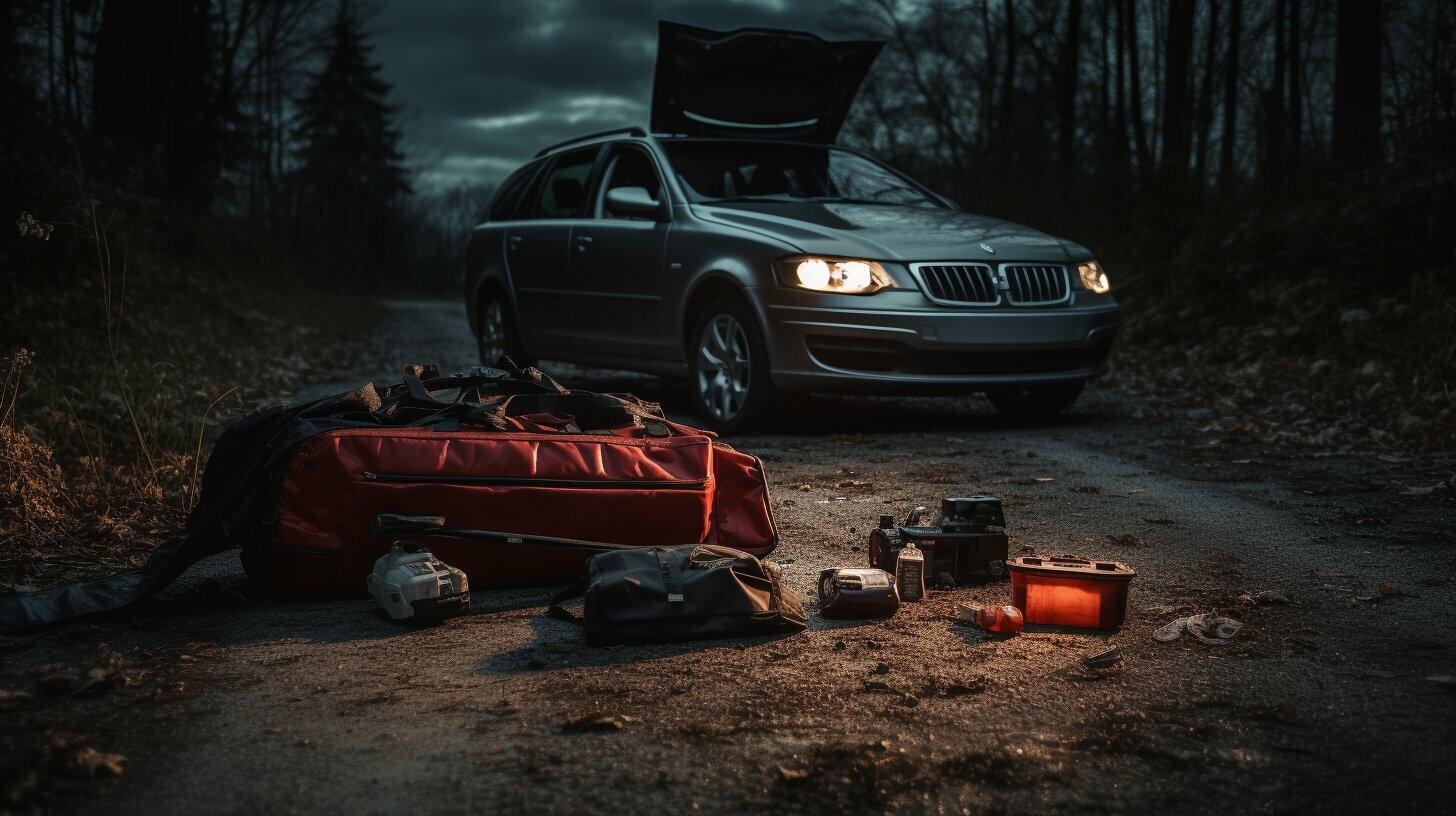
In 2020 alone, there were over 115,000 casualties and 1,460 fatalities on UK roads, underscoring the need for vehicle safety measures, including the presence of first aid kits. Road accidents can happen unexpectedly, and having access to a car first aid kit can potentially save lives. A well-stocked first aid kit in your vehicle can enable you to provide life-saving first aid and reduce the seriousness of injuries while waiting for emergency services to arrive.
Having a car first aid kit is especially crucial during long journeys or in rural areas where medical assistance may take longer to arrive. It is important to be prepared for various medical situations and provide timely assistance until professional help arrives. Some essential items that should be included in a car first aid kit are adhesive plasters, bandages, sterile gauze pads, adhesive tape, antiseptic creams, pain-relieving medication, disposable gloves, and medical instruments like a thermometer and tweezers.
In addition to these basic supplies, carrying items for severe or life-threatening emergencies, such as hot and cold compression packs, an Epi-Pen, or a portable defibrillator, may also be beneficial. Understanding how to use the supplies inside the kit and taking necessary precautions, such as sanitizing hands and disinfecting wounds before applying dressings, is crucial for effective first aid.
| Benefits of Having a Car First Aid Kit | Essential Items for a Car First Aid Kit |
|---|---|
| – Immediate access to first aid supplies | – Adhesive plasters |
| – Ability to provide life-saving first aid | – Bandages |
| – Reduction in the seriousness of injuries | – Sterile gauze pads |
| – Enhanced vehicle safety | – Adhesive tape |
| – Antiseptic creams | |
| – Pain-relieving medication | |
| – Disposable gloves | |
| – Medical instruments (e.g. thermometer, tweezers) |
Regularly replenishing the car first aid kit after use is essential to ensure that it is always well-stocked and ready for emergencies. With a car first aid kit, you can be prepared for unexpected accidents and provide immediate assistance, potentially saving lives while waiting for professional medical help to arrive.
Benefits of Having a Car First Aid Kit
Having a well-stocked first aid kit in your vehicle can enable you to provide timely and potentially life-saving assistance during roadside emergencies, making it an invaluable component of vehicle safety equipment. Road accidents can happen unexpectedly, and having access to essential first aid supplies can make a crucial difference in reducing the severity of injuries and even saving lives.
According to the latest data, in the UK alone, there were over 115,000 road casualties and 1,460 fatalities in 2020. With these alarming statistics, it becomes evident that being prepared for emergencies is of utmost importance. A car first aid kit allows you to take immediate action while waiting for professional help to arrive, providing essential care that can significantly impact the outcome of an accident or medical emergency.
Some essential items that should be included in your car first aid kit are adhesive plasters, bandages, sterile gauze pads, adhesive tape, antiseptic creams, pain-relieving medication, disposable gloves, and medical instruments like a thermometer and tweezers. These supplies can help you address common injuries such as cuts, bruises, sprains, and minor burns.

In addition to these basic supplies, it is also advisable to include items that can be instrumental in severe or life-threatening situations. For example, hot and cold compression packs can provide relief for sprains and reduce swelling, while an Epi-Pen can be vital in case of severe allergic reactions. Carrying a portable defibrillator can also be beneficial, as it can help restore normal heart rhythms in the event of a cardiac emergency.
Understanding how to use the supplies inside the car first aid kit and taking necessary precautions is crucial. This includes sanitizing hands and disinfecting wounds before applying dressings, as well as familiarizing yourself with proper first aid techniques.
Regularly replenishing your first aid kit after use is essential to ensure that all supplies are up to date and ready for emergencies. This includes checking expiration dates on medication and replacing any items that have been used or are no longer in optimal condition. By maintaining a well-stocked and updated car first aid kit, you can be better prepared for various medical situations and provide timely assistance until professional help arrives.
| Essential Items for a Car First Aid Kit | Additional Items for Severe Emergencies |
|---|---|
| Adhesive plasters | Hot and cold compression packs |
| Bandages | Epi-Pen |
| Sterile gauze pads | Portable defibrillator |
| Adhesive tape | |
| Antiseptic creams | |
| Pain-relieving medication | |
| Disposable gloves | |
| Thermometer | |
| Tweezers |
Save this table completely.
Essential Items for a Car First Aid Kit
A car first aid kit should contain essential items such as adhesive plasters, bandages, sterile gauze pads, adhesive tape, antiseptic creams, pain-relieving medication, disposable gloves, and medical instruments like a thermometer and tweezers. These items are crucial for addressing minor injuries and providing immediate care in case of accidents or emergencies. Let’s take a closer look at each of these essential supplies:
- Adhesive plasters: These are handy for covering small wounds and preventing further contamination. They come in various shapes and sizes to suit different types of injuries.
- Bandages: Bandages are versatile and can be used to secure dressings, support sprained joints, or control bleeding. It is advisable to have both adhesive and elastic bandages in your car first aid kit.
- Sterile gauze pads: These sterile pads are used for cleaning wounds, applying antiseptic solutions, and covering larger injuries. They help prevent infections and promote faster healing.
- Adhesive tape: Adhesive tape is used to secure dressings, bandages, and gauze pads in place. It provides additional support and ensures that the wound remains covered and protected.
- Antiseptic creams: These creams or ointments are applied to wounds to prevent infections. They help kill bacteria and reduce the risk of complications.
- Pain-relieving medication: As accidents can cause pain and discomfort, it is essential to include pain-relieving medication, such as paracetamol or ibuprofen, in your car first aid kit. However, always consult a healthcare professional before administering any medication.
- Disposable gloves: Disposable gloves are crucial for maintaining hygiene when providing first aid. They protect both the responder and the injured person from potential infections or cross-contamination.
- Medical instruments: Medical instruments like a thermometer and tweezers are necessary for assessing body temperature and removing splinters or other foreign objects safely.
Having these essential items in your car first aid kit will ensure that you are adequately prepared to handle common medical situations and provide immediate care when needed. Remember to regularly check your kit and replace any expired or used supplies to maintain its effectiveness.
By having a well-stocked car first aid kit, you can be empowered to handle minor injuries and potentially save lives while waiting for professional medical assistance. It is a small investment in vehicle safety that can make a significant difference in emergency situations.
| Item | Description |
|---|---|
| Adhesive plasters | For covering small wounds and preventing contamination |
| Bandages | For securing dressings, supporting sprained joints, or controlling bleeding |
| Sterile gauze pads | For cleaning wounds, applying antiseptic solutions, and covering larger injuries |
| Adhesive tape | For securing dressings, bandages, and gauze pads in place |
| Antiseptic creams | For preventing infections and promoting healing |
| Pain-relieving medication | For managing pain and discomfort |
| Disposable gloves | For maintaining hygiene during first aid procedures |
| Medical instruments | Such as a thermometer and tweezers for assessment and removal of foreign objects |
Additional Considerations for Severe Emergencies
In addition to the essential items mentioned above, it is crucial to consider adding items for severe or life-threatening emergencies to your car first aid kit. These can include hot and cold compression packs for managing injuries and reducing pain, an Epi-Pen for severe allergic reactions, or even a portable defibrillator for cardiac emergencies. These specialized items can provide critical support until professional medical help arrives.
Remember, it is essential to educate yourself on how to use the supplies inside your car first aid kit and take necessary precautions, such as sanitizing hands and disinfecting wounds before applying dressings. Regularly replenishing the kit after use is also essential to ensure that you are always prepared for medical situations on the road.
With a well-prepared car first aid kit, you can be a proactive responder in emergencies and contribute to overall vehicle safety and emergency preparedness.
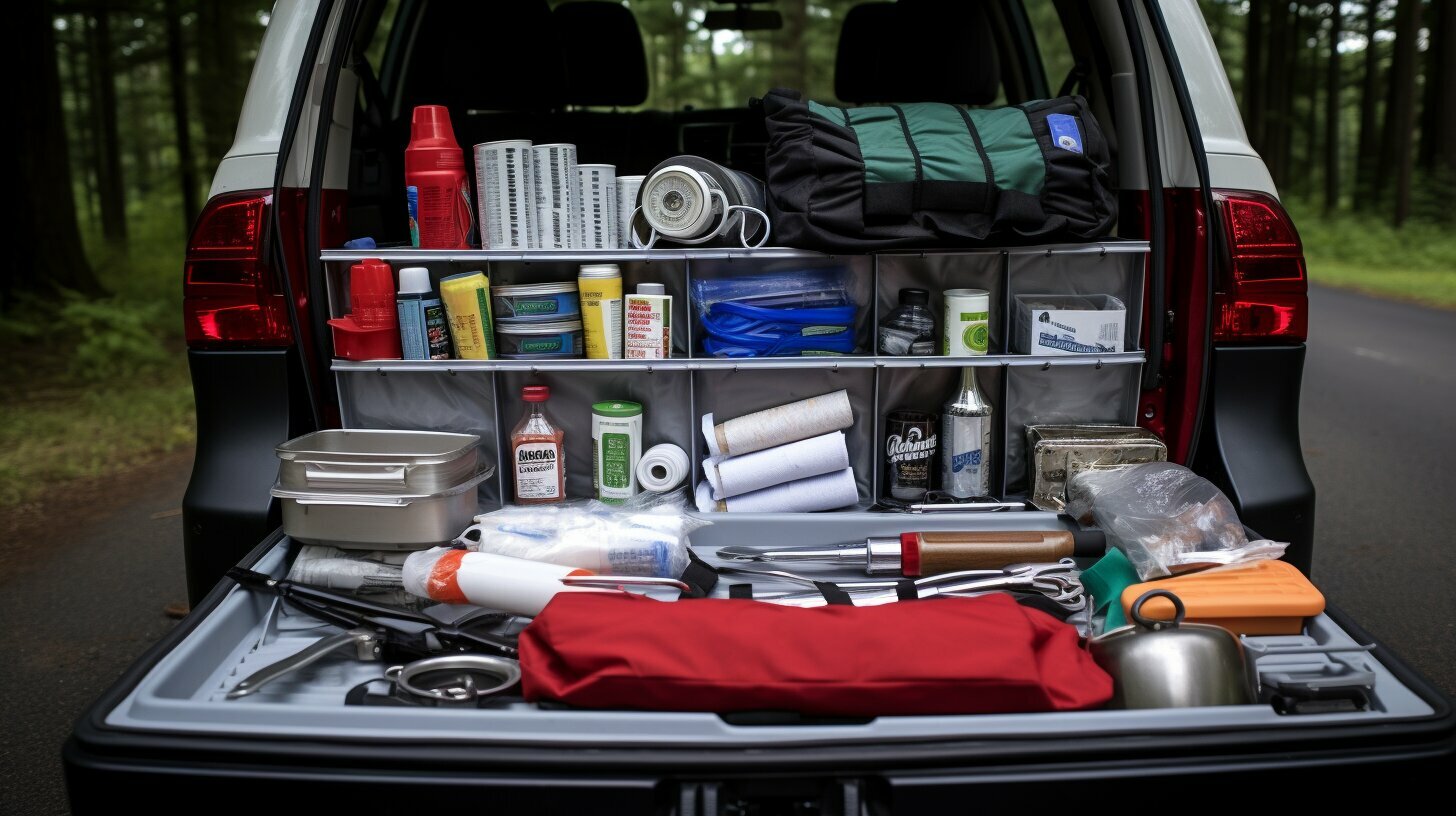
table {
width: 100%;
border-collapse: collapse;
}
th, td {
padding: 8px;
text-align: left;
border-bottom: 1px solid #ddd;
}
th {
background-color: #f2f2f2;
}
Additional Considerations for Severe Emergencies
In certain situations, it may be beneficial to carry additional items in your car first aid kit, such as hot and cold compression packs, an Epi-Pen, or a portable defibrillator, to address severe or life-threatening emergencies. These items can provide critical support when faced with sudden medical crises.
Hot and cold compression packs are versatile tools that can help alleviate pain and reduce swelling. They can be used to treat injuries like sprains, strains, and muscle spasms. Applying a cold pack immediately after an injury can help minimize swelling, while a hot pack can help relax muscles and reduce discomfort during recovery. Having both types available in your car first aid kit ensures you can provide immediate relief in case of an emergency.
An Epi-Pen is an auto-injector device designed to deliver a dose of epinephrine in the event of a severe allergic reaction. It can be a life-saving tool for individuals with known allergies or in situations where an allergic reaction occurs unexpectedly. Keeping an Epi-Pen in your car can provide peace of mind and allow for prompt intervention should an allergic emergency arise.
Another crucial addition to consider is a portable defibrillator, also known as an automated external defibrillator (AED). Sudden cardiac arrest can happen at any time, and having access to a defibrillator can significantly increase the chances of survival. These portable devices can analyze heart rhythms and deliver electrical shocks to restore normal heart function. While they may not be required for every emergency, their presence can be a lifesaver in critical situations.
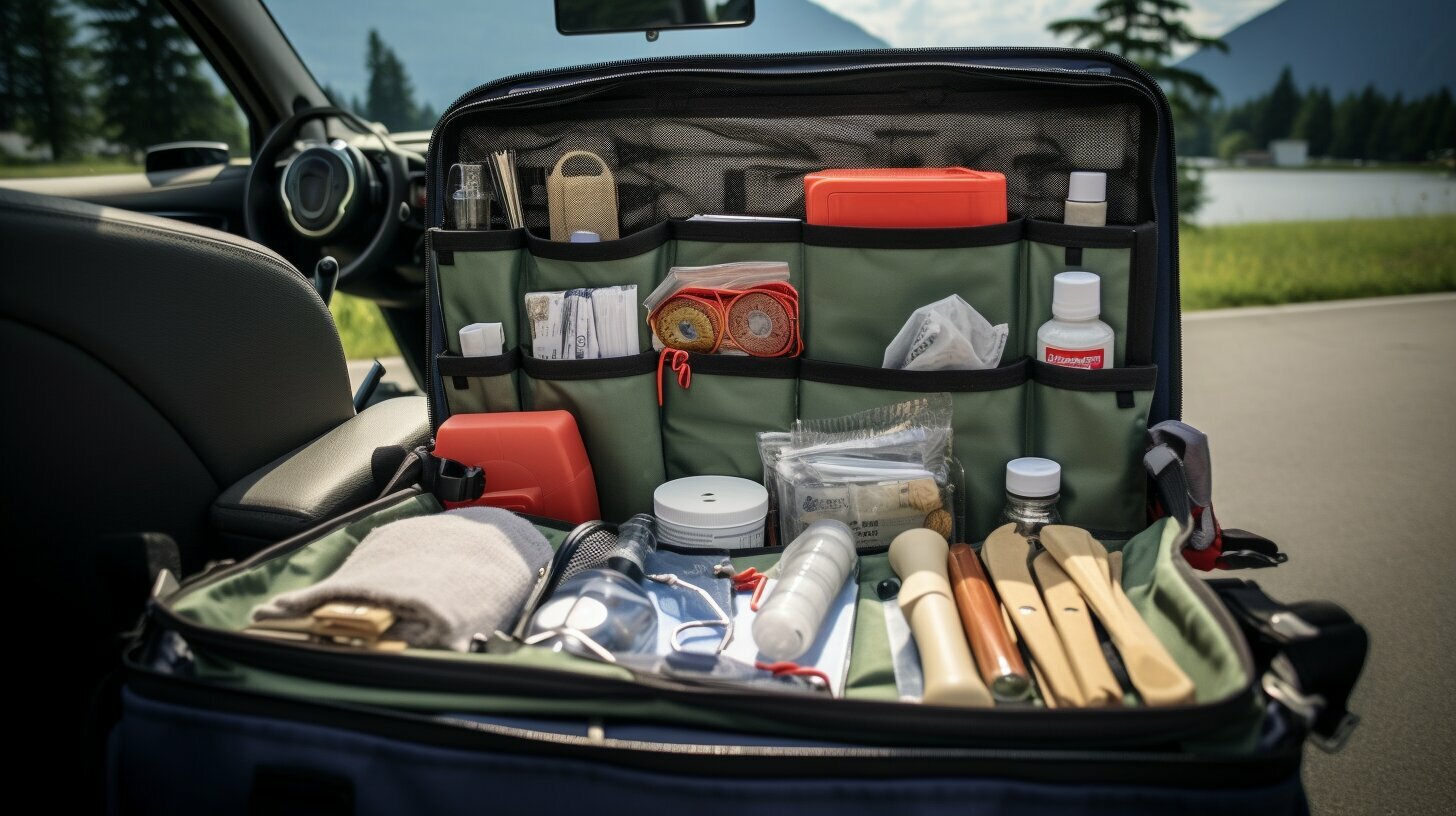
| Item | Purpose |
|---|---|
| Hot and cold compression packs | Alleviate pain and reduce swelling |
| Epi-Pen | Treat severe allergic reactions |
| Portable defibrillator (AED) | Restore normal heart function in cases of cardiac arrest |
By including these additional items in your car first aid kit, you enhance your ability to respond effectively to severe emergencies that may occur on the road. Remember, being prepared and having the necessary tools at hand can make a critical difference in saving lives and ensuring the safety of yourself and others.
Proper Usage and Precautions
It is crucial to familiarize yourself with the contents of your car first aid kit and understand how to use them properly, ensuring vehicle safety during emergency situations. When faced with an accident or medical emergency on the road, knowing how to administer first aid can make a significant difference in saving lives and reducing the severity of injuries.
Start by carefully reading the instructions provided with each item in your car first aid kit. This will help you understand the purpose of each item and how to use them correctly. For example, adhesive plasters should be applied to clean and dry skin to protect minor cuts or blisters, while bandages and sterile gauze pads can be used to control bleeding and dress wounds.
It is important to maintain proper hygiene when providing first aid. Before touching any wounds or using any supplies, ensure that your hands are clean. If possible, use disposable gloves to further minimize the risk of infection. Remember to replace gloves after each use to avoid cross-contamination.
Additionally, disinfecting wounds before applying dressings can help prevent infection. Antiseptic creams or solutions, such as hydrogen peroxide or alcohol wipes, can be used for this purpose. However, it is essential to follow the instructions provided on the packaging and avoid applying antiseptics to sensitive areas, such as the eyes or open wounds.
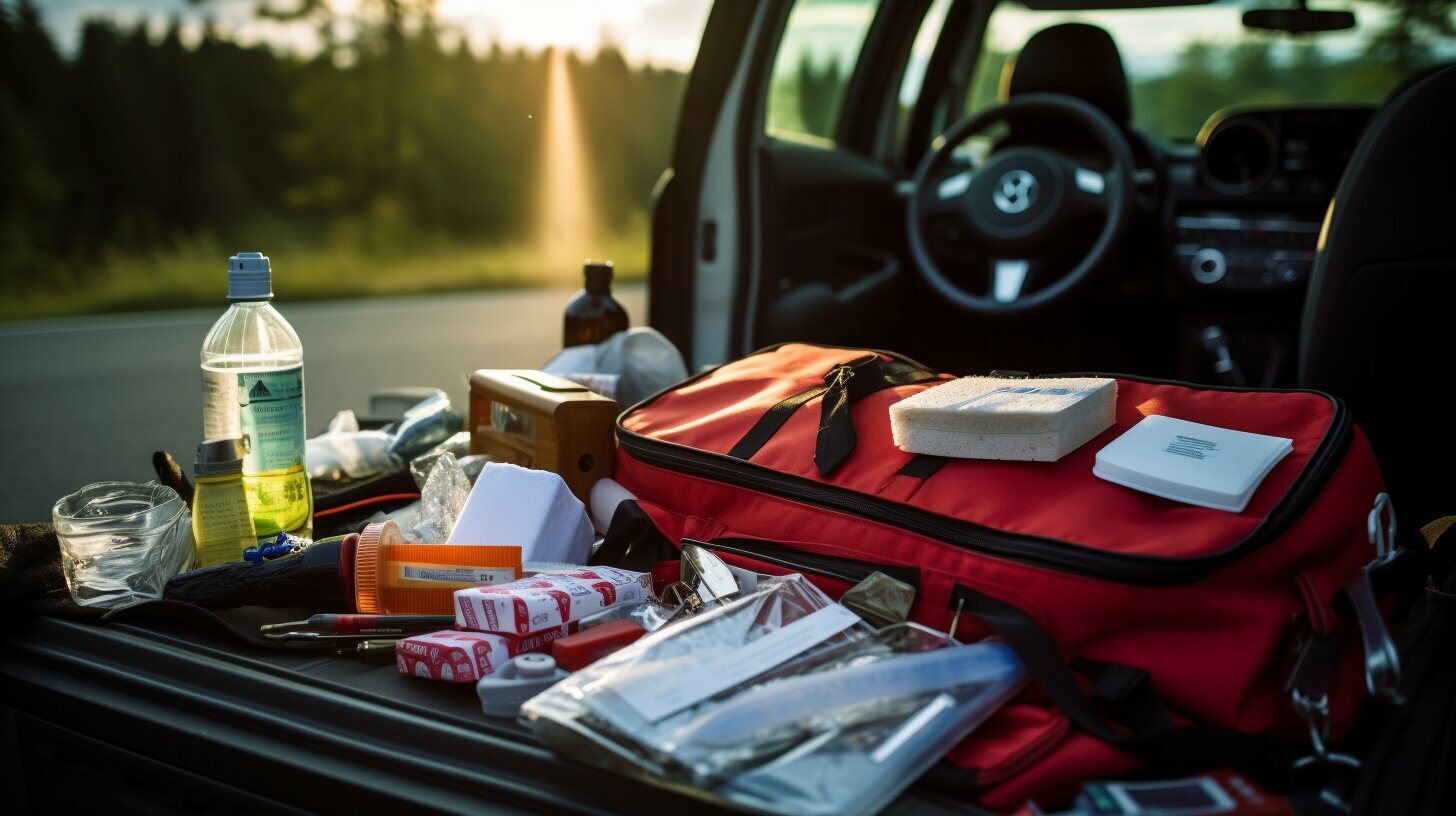
By understanding how to use the supplies inside your car first aid kit properly, you can provide effective first aid in emergency situations. This not only ensures vehicle safety but also promotes the well-being of all individuals involved. Remember to regularly check the expiration dates of items in your kit and replenish them as needed. With a well-prepared first aid kit, you can be ready to handle unexpected situations on the road and provide necessary assistance until professional help arrives.
| Essential Items for a Car First Aid Kit | Additional Considerations for Severe Emergencies |
|---|---|
|
|
Maintenance and Replenishment of the First Aid Kit
Regularly checking and replenishing the supplies in your car first aid kit is essential for ensuring vehicle safety and emergency preparedness, as it ensures that all necessary items are readily available when needed.
Over time, some items in your first aid kit may expire or become damaged, rendering them ineffective during an emergency. By regularly reviewing and restocking your kit, you can ensure that you have fresh and functional supplies at all times.
A good practice is to perform a monthly inventory check of your kit. Inspect each item, ensuring that they are in good condition, are within their expiration dates, and have not been tampered with. Replace any expired or damaged items immediately.
Additionally, it is crucial to be aware of any specific needs or medical conditions within your household or travel companions. Consider including any necessary medications or medical supplies that may not be found in a standard first aid kit, such as inhalers for asthma or epinephrine auto-injectors for severe allergies.
By prioritizing the maintenance and replenishment of your car first aid kit, you can have peace of mind knowing that you are prepared for various medical situations and can provide timely assistance until professional help arrives. Remember, it is always better to be safe than sorry when it comes to vehicle safety and emergency preparedness.
